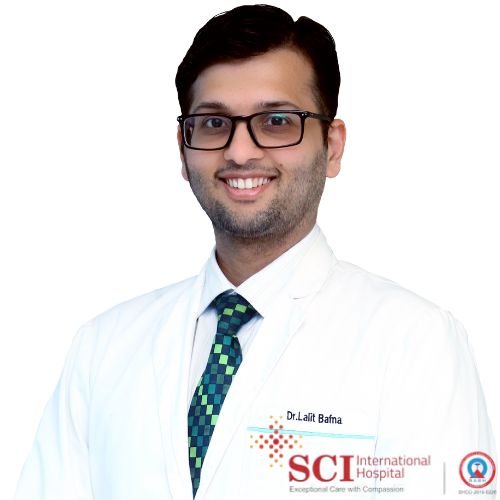A rotator cuff tear is a common shoulder injury that can cause pain, weakness, and limited movement. It often happens from wear and tear, repetitive use, or an accident. Some tears can be managed with rest, physical therapy, and medication, while others may need surgery. The right treatment depends on the size of the tear, your symptoms, and your activity level. With proper care, most people regain strength and return to normal activities.
We Are Rated
Consult Now
Your shoulder is an amazing joint. It lets you move your arm in many ways. A key part of your shoulder is the "rotator cuff." This is a group of four main muscles and their strong ropes called tendons. These tendons wrap around the top of your upper arm bone. They help keep your arm bone snug in its shallow socket. They also help you lift and turn your arm. A rotator cuff tear happens when one or more of these tendons gets ripped. This can be a small rip, called a "partial tear." Or it can be a rip that goes all the way through, called a "full tear." This injury is a very common cause of shoulder pain and makes it hard to use your arm.
Your shoulder is an amazing joint. It lets you move your arm in many ways. A key part of your shoulder is the "rotator cuff." This is a group of four main muscles and their strong ropes called tendons. These tendons wrap around the top of your upper arm bone. They help keep your arm bone snug in its shallow socket. They also help you lift and turn your arm. A rotator cuff tear happens when one or more of these tendons gets ripped. This can be a small rip, called a "partial tear." Or it can be a rip that goes all the way through, called a "full tear." This injury is a very common cause of shoulder pain and makes it hard to use your arm.
What Causes a Rotator Cuff Tear?
A sudden injury can cause a tear. This might happen if you fall on an outstretched arm. Or if you lift something too heavy with a quick, jerky movement. Direct hits to the shoulder, like in a car accident or sports, can also cause these tears.
How a Rotator Cuff Tear Happens
More often, tears happen because the tendons wear down slowly over time. This is called a "degenerative tear." Several things can make this happen:
It's unlikely that just sleeping on your side will cause a healthy rotator cuff to tear. But if you already have some shoulder issues, sleeping on that side can make things worse. Lying on your shoulder for a long time can squeeze the joint.
The signs of a rotator cuff tear can start slowly from wear and tear. Or they can appear suddenly after an injury. Look for these common signs:
The pain is usually felt on the front and outer part of the shoulder. Many people say it's a deep ache inside the joint. This pain can travel down the side of your upper arm, but usually stops before your elbow.
Pain from a rotator cuff tear is mainly in the shoulder and upper arm. But sometimes, you might feel pain in other areas. This is called "referred pain" or related pain.
More often, tears happen because the tendons wear down slowly over time. This is called a "degenerative tear." Several things can make this happen:
It's unlikely that just sleeping on your side will cause a healthy rotator cuff to tear. But if you already have some shoulder issues, sleeping on that side can make things worse. Lying on your shoulder for a long time can squeeze the joint.
The signs of a rotator cuff tear can start slowly from wear and tear. Or they can appear suddenly after an injury. Look for these common signs:
The pain is usually felt on the front and outer part of the shoulder. Many people say it's a deep ache inside the joint. This pain can travel down the side of your upper arm, but usually stops before your elbow.
Pain from a rotator cuff tear is mainly in the shoulder and upper arm. However, sometimes you may experience pain in other areas. This is referred to as "referred pain" or "related pain."
Physical Examination: How to Test for a Rotator Cuff Tear
Your doctor will start by carefully examining your shoulder. This is a very important part of finding out what's wrong. They will ask you to move your arm in different ways to see how far it can go. They will also test the strength of your arm and shoulder muscles.
Advanced Imaging: Can an MRI Miss a Rotator Cuff Tear?
After the physical exam, imaging tests help confirm the diagnosis. They give important details about the size and exact spot of the tear.

MBBS, MS - Orthopaedics, Orthopaedic surgeon, Joint Replacement Surgeon

MBBS, MS, DNB - Orthopedic Surgery, FNB - Sports Medicine, Orthopedic surgeon
Finding the right treatment depends on the severity of your tear, your age, and your activity level. At SCI Hospital, we create a personalized plan to fix your rotator cuff tear and get you back to your routine.
Many rotator cuff tears can heal without surgery, especially if they're caught early and treated properly. Small to medium-sized tears often respond well to conservative treatment
Healing a Rotator Cuff Tear Naturally with Rest and Therapy
Often, non-surgical treatment is the first approach. It includes:
With a focused non-surgical plan, many people feel much less pain and use their arm better within a few weeks to a few months. How long it takes depends on the size of the tear, your age, and how much you stick to your physical therapy program.
Surgery may be suggested if your symptoms have lasted for 6 to 12 months, other treatments haven't helped, the tear is large (more than 3 cm), or it happened suddenly from a recent injury.
The main goal of surgery is to reattach the torn tendon back to the upper arm bone. The most common way to do this now is called "arthroscopic repair." This is a modern, less invasive surgery. The surgeon makes a few tiny cuts. They use a small camera (called an arthroscope) and special tools to fix the tendon.
Recovering from shoulder surgery is a slow process. You will need to wear a sling for 4 to 6 weeks. Rehabilitation with physical therapy is extremely important and starts with passive motion, gradually moving to active strengthening exercises over several months. A full recovery can take anywhere from 4-6 months to a year.
You can't prevent all tears, especially those from sudden accidents. But you can lower your risk of tears that develop over time. The key is to keep your shoulder muscles strong and flexible.
When facing a rotator cuff tear, you need a team that combines expertise with personalized care. At SCI Hospital, our orthopedic specialists are renowned for their skill in diagnosing and treating the full spectrum of shoulder injuries. We use advanced diagnostic tools to get a precise understanding of your injury, which allows us to create a treatment plan tailored just for you.
You can prevent a partial tear from becoming a full tear by getting treatment early. At SCI Hospital, our experts can help you with a personalized treatment plan, including physical therapy and activity modification, to prevent the tear from getting worse. You can book an appointment with us through a call or an online consultation.
A massive rotator cuff tear is a serious injury that can cause significant pain and weakness. If you're experiencing severe shoulder pain, don't hesitate to reach out to SCI Hospital. Our specialists can diagnose and treat your condition, providing you with the best possible care. You can schedule an offline consultation with our experts to discuss your treatment options.
While a rotator cuff tear doesn't directly cause shoulder dislocation, it can make your shoulder weaker and more unstable. If you're experiencing shoulder instability or pain, contact SCI Hospital for an appointment. Our doctors can assess your condition and provide guidance on the best course of treatment, which may include physical therapy or surgery. You can book an online consultation with our specialists to discuss your concerns.
A rotator cuff tear can significantly limit your shoulder's movement and strength. At SCI Hospital, our experts can help you regain strength and mobility through personalized treatment plans. Don't let shoulder pain hold you back – schedule an appointment with us today through a call or online consultation, and take the first step towards recovery.
Consult Now
